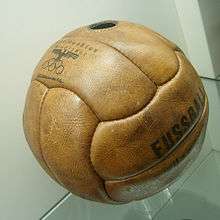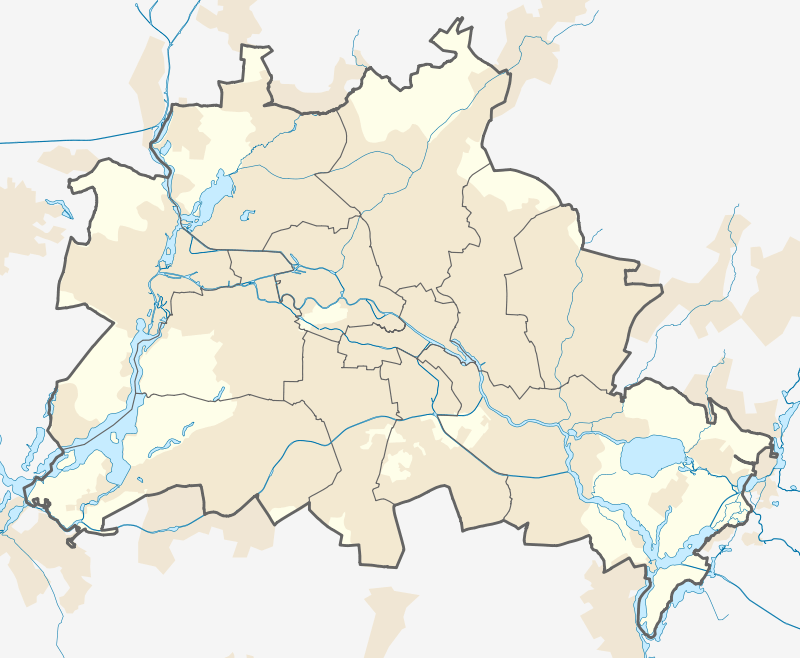Football at the 1936 Summer Olympics
| Men's football at the Games of the XI Olympiad | |||||||
| Venues | Berlin Poststadion Berlin Mommsenstadion Berlin Hertha-BSC Platz | ||||||
|---|---|---|---|---|---|---|---|
| Dates | Aug 3-15 | ||||||
| Medalists | |||||||
Football at the 1936 Summer Olympics tournament, won by Italy, has come to share an affinity with the political backdrop against which it was being played. In terms of the history of association football, however, the tournament suffered as a reaction to the development of the FIFA World Cup.
The introduction of the first FIFA World Cup in 1930 (which had, in itself lead to the absence of a football tournament from the 1932 Games programme) led to a devaluation in the strength of each subsequent Olympic football tournament. Competing nations would from now on only be permitted to play their best players if those players were amateur or (where national associations were assisted by interested states to traverse such a rule) where professional players were state-sponsored.[1]
The reinstatement of Olympic football was ensured in 1936 because the German organisers were confident that such a competition would be justified by the income it would generate. The fear that any failure by the host side would result in a loss of income had been a matter of contention despite the fact that going into the competition Germany were one of the favourites (They had only lost at home once in three years). In the event, the early failure of the national side did nothing to deter the supporters, as the bronze and gold medal games were watched by a combined total of 195,000 people.
Venues
| Berlin | Football at the 1936 Summer Olympics (Berlin) |
Berlin | |
|---|---|---|---|
| Olympiastadion | Stadion am Gesundbrunnen | ||
| Capacity: 100,000 | Capacity: 35,239 | ||
 |
|||
| Berlin | Berlin | ||
| Poststadion | Mommsenstadion | ||
| Capacity: 45,000 | Capacity: 15,005 | ||
 |
|||
Squads
- Main article: Football at the 1936 Summer Olympics - Men's team squads
Medalists
Final tournament
The competition began in dramatic circumstances. The Italians, winners against the Austrians at the 1934 World Cup now found the Olympic side, with ten changes, a completely different proposition. The Azzurri included players such as Alfredo Foni, Pietro Rava and Ugo Locatelli, who would all play in their World Cup victory in Paris. That they eventually prevailed was due to two incidents: the first when their bespectacled forward Frossi scored, the second when Weingartner, the German referee, was literally restrained from sending off Archille Piccini after fouling two Americans. Italian players held both his arms and covered his mouth in protest. Piccini stayed on the park, Italy won.[2]
This was something more than Sweden managed in their tie with Japan the next day in Berlin. Two-nil up within 45 minutes, their demise was shockingly recorded by the legendary Swedish commentator, Sven Jerring, calling “Japanese, Japanese, Japanese” (Japaner, japaner, japaner…) as they ran out as winners 3–2. It marked the first time an Asian side had participated in either the World Cup or Olympic Games football competition and the first time an Asian side emerged victorious. Their neighbours, China, lost 0–2 to Great Britain on the next day. Otherwise there were thumping wins for Peru and the hosts, 9–0 versus Luxembourg.
First round
August 3, 1936 17:30 |
| Italy |
1–0 | |
|---|---|---|
| Frossi |
Report |
Berlin Poststadion Referee: Carl Weingartner (GER) |
August 3, 1936 17:30 |
| Norway |
4–0 | |
|---|---|---|
| Martinsen Brustad Kvammen |
Report |
Berlin Mommsenstadion Referee: Giuseppe Scarpi (ITA) |
August 4, 1936 17:30 |
| Japan |
3–2 | |
|---|---|---|
| Kamo Ukon Matsunaga |
Report | Persson |
Berlin Hertha-BSC-Platz Referee: Wilhelm Peters (GER) |
August 4, 1936 17:30 |
| Germany |
9–0 | |
|---|---|---|
| Urban Simetsreiter Gauchel Elbern |
Report |
Berlin Poststadion Referee: Pál von Hertzka (HUN) |
August 5, 1936 17:30 |
| Poland |
3–0 | |
|---|---|---|
| Gad Wodarz |
Report |
Berlin Poststadion Referee: Raffaele Scorzoni (ITA) |
August 5, 1936 17:30 |
| Austria |
3–1 | |
|---|---|---|
| Steinmetz Laudon |
Report | Sakr |
Berlin Mommsenstadion Referee: Arthur James Jewell (GBR) |
August 6, 1936 17:30 |
| Peru |
7–3 | |
|---|---|---|
| Fernández Villanueva |
Report | Kanerva Grönlund Larvo |
Berlin Hertha-BSC-Platz Referee: Rinaldo Barlassina (ITA) |
Quarter finals


Italy, now finding their feet against Japan, (and having made but one change to their team) made no mistake in their tie, winning as comprehensively as they had struggled against the Americans. Pozzo’s decision to include Biagi bore instant fruit, Baigi scoring 4 goals.
The same day at the Poststadion, Berlin before a crowd that included Goebbels, Göring, Hess and Hitler, Germany were knocked out 2–0 by Norway. Goebbels wrote: 'The Führer is very excited, I can barely contain myself. A real bath of nerves.' There was no real surprise to the result to those outside the higher ranks of the Third Reich. Norway, went on to give Italy a tricky tie in the first round of the 1938 FIFA World Cup. But Germany lost 2–0 and Hitler, who had never seen a football match before, and had originally planned to watch the rowing, left early in a huff.[4]
The following day at the Hertha Platz, Austria played Peru in an astonishing game leading to a huge political row not out of keeping with the times. (See Peru v Austria (1936).) The match was highly contested, and the game went into overtime when the Peruvians tied the Austrians after being two goals behind. Peru scored 5 goals during overtime, of which 3 were nullified by the referee, and won by the final score of 4–2.[5][6] The Austrians demanded a rematch on the grounds that Peruvian fans had stormed the field, and because the field did not meet the requirements for a football game.[6][7] Austria further claimed that the Peruvian players had manhandled the Austrian players and that spectators, one holding a revolver, had "swarmed down on the field."[8] Peru was notified of this situation, and they attempted to go to the assigned meeting but were delayed by a German parade.[6] At the end, the Peruvian defense was never heard, and the Olympic Committee and FIFA sided with the Austrians. The rematch was scheduled to be taken under close grounds on August 10, and later re-scheduled to be taken on August 11.[7][8]
As a sign of protest against these actions, which the Peruvians deemed as insulting and discriminatory, the complete Olympic delegations of Peru and Colombia left Germany.[9][10] Argentina, Chile, Uruguay, and Mexico expressed their solidarity with Peru.[8] Michael Dasso, a member of the Peruvian Olympic Committee, stated: "We've no faith in European athletics. We have come here and found a bunch of merchants."[11] The game was awarded to Austria by default.[8] In Peru, angry crowds protested against the decisions of the Olympic Committee by tearing down an Olympic flag, throwing stones at the German consulate, refusing to load German vessels in the docks of Callao, and listening to inflammatory speeches which included President Oscar Benavides Larrea's mention of "the crafty Berlin decision."[8] To this day, it is not known with certainty what exactly happened at Germany, but it is popularly believed that Adolf Hitler and the Nazi authorities might have had some involvement in this situation.[10]
The last of the quarter-finals had all of the excitement but none of the fall-out; Poland, assisted by their forward, Hubert Gad, played out a nine-goal party to defeat the British side; at one time they were 5–1 to the better. The Casual's Bernard Joy scored two as Britain fought back gamely but they ran out of time. Prior to the Games Daniel Pettit received a letter from the Football Association which dealt mostly with the uniform he would wear. As he explained to the academic Rachel Cutler there was a handwritten PS that said: 'As there is a month to go before we leave for Berlin kindly take some exercise.' The obedient Petit ran around his local park. [4]
August 7, 1936 17:30 |
| Italy |
8–0 | |
|---|---|---|
| Frossi Biagi Cappelli |
Report |
Berlin Mommsenstadion Referee: Otto Ohlsson (SWE) |
August 7, 1936 17:30 |
| Germany |
0–2 | |
|---|---|---|
| Report | Isaksen |
Berlin Poststadion Referee: Arthur Willoughby Barton (GBR) |
August 8, 1936 17:30 |
| Poland |
5–4 | |
|---|---|---|
| Gad Wodarz Piec |
Report | Clements Shearer Joy |
Berlin Poststadion Referee: Rudolf Eklow (SWE) |
August 8, 1936 17:30 |
| Peru |
4–2 (a.e.t.) 1 | |
|---|---|---|
| Alcalde Villanueva Fernández |
Report | Wergin Steinmetz |
Berlin Hertha-BSC Platz Referee: Thoralf Kristiansen (NOR) |
1 Due to a pitch invasion, the match was declared null and void, and ordered to be replayed on August 10. Peru objected to the replay decision and withdrew from the tournament.
Semi finals
Bronze medal match
August 13, 1936 16:00 |
| Norway |
3–2 | |
|---|---|---|
| Brustad |
Report | Wodarz Peterek |
Berlin Olympic Stadium (Berlin) Referee: Alfred Birlem (GER) |
The Final (Gold medal match)
Italy now overcame Austria in a match refereed by Dr Peco Bauwens; the Austrians having defeated Poland to attend the final. Not that there was much in it; Frossi again scoring for the Azzurri and getting the winner just as extra-time got underway.
August 15, 1936 16:00 |
| Italy |
2–1 (a.e.t.) | |
|---|---|---|
| Frossi |
Report | Kainberger |
Berlin Olympic Stadium (Berlin) Referee: Peco Bauwens (GER) |
Bracket
| Round of 16 | Quarter-finals | Semi-finals | Final | |||||||||||
| 3 August – Berlin | ||||||||||||||
| |
1 | |||||||||||||
| 7 August – Berlin | ||||||||||||||
| |
0 | |||||||||||||
| |
8 | |||||||||||||
| 4 August – Berlin | ||||||||||||||
| |
0 | |||||||||||||
| |
3 | |||||||||||||
| 10 August – Berlin | ||||||||||||||
| |
2 | |||||||||||||
| |
2 | |||||||||||||
| 3 August – Berlin | ||||||||||||||
| |
1 | |||||||||||||
| |
4 | |||||||||||||
| 7 August – Berlin | ||||||||||||||
| |
0 | |||||||||||||
| |
2 | |||||||||||||
| 4 August – Berlin | ||||||||||||||
| |
0 | |||||||||||||
| |
9 | |||||||||||||
| 15 August – Berlin | ||||||||||||||
| |
0 | |||||||||||||
| |
2 | |||||||||||||
| 5 August – Berlin | ||||||||||||||
| |
1 | |||||||||||||
| |
3 | |||||||||||||
| 8 August – Berlin | ||||||||||||||
| |
1 | |||||||||||||
| |
2 | |||||||||||||
| 6 August – Berlin | ||||||||||||||
| |
42 | |||||||||||||
| |
7 | |||||||||||||
| 11 August – Berlin | ||||||||||||||
| |
3 | |||||||||||||
| |
3 | |||||||||||||
| 5 August – Berlin | ||||||||||||||
| |
1 | Third Place | ||||||||||||
| |
3 | |||||||||||||
| 8 August – Berlin | 13 August – Berlin | |||||||||||||
| |
0 | |||||||||||||
| |
5 | |
3 | |||||||||||
| 6 August – Berlin | ||||||||||||||
| |
4 | |
2 | |||||||||||
| |
2 | |||||||||||||
| |
0 | |||||||||||||
- 2 Withdrew.
Goalscorers
- 7 goals
-
.svg.png) Annibale Frossi (Italy)
Annibale Frossi (Italy)
- 6 goals
-
 Teodoro Fernández (Peru)
Teodoro Fernández (Peru)
- 5 goals
-
 Arne Brustad (Norway)
Arne Brustad (Norway) -
.svg.png) Gerard Wodarz (Poland)
Gerard Wodarz (Poland)
- 4 goals
-
.svg.png) Carlo Biagi (Italy)
Carlo Biagi (Italy) -
 Alejandro Villanueva (Peru)
Alejandro Villanueva (Peru) -
.svg.png) Hubert Gad (Poland)
Hubert Gad (Poland)
- 3 goals
-
 Klement Steinmetz (Austria)
Klement Steinmetz (Austria) -
.svg.png) Wilhelm Simetsreiter (Germany)
Wilhelm Simetsreiter (Germany) -
.svg.png) Adolf Urban (Germany)
Adolf Urban (Germany)
- 2 goals
-
 Karl Kainberger (Austria)
Karl Kainberger (Austria) -
 Adolf Laudon (Austria)
Adolf Laudon (Austria) -
.svg.png) Josef Gauchel (Germany)
Josef Gauchel (Germany) -
 Bernard Joy (Great Britain)
Bernard Joy (Great Britain) -
 Magnar Isaksen (Norway)
Magnar Isaksen (Norway) -
 Alf Martinsen (Norway)
Alf Martinsen (Norway) -
 Erik Persson (Sweden)
Erik Persson (Sweden)
- 1 goal
-
 Franz Mandl (Austria)
Franz Mandl (Austria) -
 Walter Werginz (Austria)
Walter Werginz (Austria) -
.svg.png) Abdel-Karim Sakr (Egypt)
Abdel-Karim Sakr (Egypt) -
 Ernst Grönlund (Finland)
Ernst Grönlund (Finland) -
 William Kanerva (Finland)
William Kanerva (Finland) -
 Pentti Larvo (Finland)
Pentti Larvo (Finland) -
.svg.png) Franz Elbern (Germany)
Franz Elbern (Germany) -
 Bertram Clements (Great Britain)
Bertram Clements (Great Britain) -
 John Doods (Great Britain)
John Doods (Great Britain) -
 Lester Finch (Great Britain)
Lester Finch (Great Britain) -
 Edgar Shearer (Great Britain)
Edgar Shearer (Great Britain) -
.svg.png) Giulio Cappelli (Italy)
Giulio Cappelli (Italy) -
.svg.png) Alfonso Negro (Italy)
Alfonso Negro (Italy) -
.svg.png) Shogo Kamo (Japan)
Shogo Kamo (Japan) -
.svg.png) Akira Matsunaga (Japan)
Akira Matsunaga (Japan) -
.svg.png) Tokutaro Ukon (Japan)
Tokutaro Ukon (Japan) -
 Reidar Kvammen (Norway)
Reidar Kvammen (Norway) -
 Jorge Alcalde (Peru)
Jorge Alcalde (Peru) -
.svg.png) Teodor Peterek (Poland)
Teodor Peterek (Poland) -
.svg.png) Ryszard Piec (Poland)
Ryszard Piec (Poland)
References
- ↑ Politika, October 18, 1935, p. 11 Serbian Cyrillic: {{{1}}}
- ↑ http://my.opera.com/quizzer123/blog/show.dml/325679
- ↑ English football statistics said that in this game played Daniel Pettit (instead of John Sutcliffe)
- 1 2 http://www.guardian.co.uk/sydney/story/0,,366607,00.html
- ↑ The forgotten story of ... football, farce and fascism at the 1936 Olympics
- 1 2 3 "Las épocas doradas del fútbol peruano y las Olimpiadas de 1936" (PDF). Beta.upc.edu.pe (in Spanish). Retrieved 2009-02-14.
- 1 2 "Controversia Berlín 36. Un mito derrumbado" (in Spanish). Larepublica.com.pe. Retrieved 2009-02-15.
- 1 2 3 4 5 "Sport: Olympic Games (Concl'd)". Time.com. 1936-08-24. Retrieved 2010-01-24.
- ↑ http://web.archive.org/web/20070704145725/www.todosports.com/inicio/articulos/gente/2800.aspx
- 1 2 "Las Olimpiadas de Berlín". futbolperuano.com (in Spanish). Retrieved 2007-08-21.
- ↑ "Sport: Olympic Games (Concl'd)". Time. 1936-08-24. Retrieved 2010-05-02.
External links
| Wikimedia Commons has media related to Association football at the 1936 Summer Olympics. |


